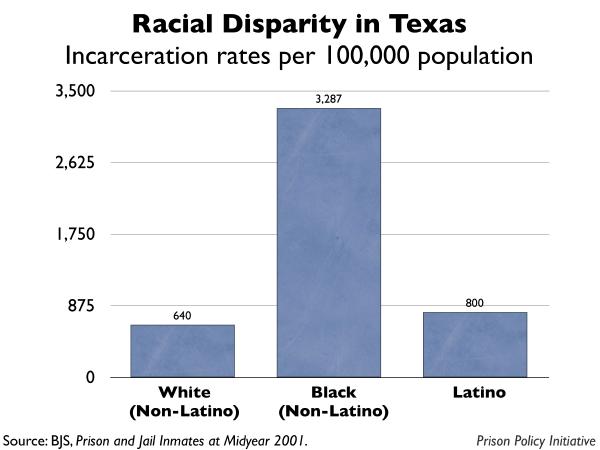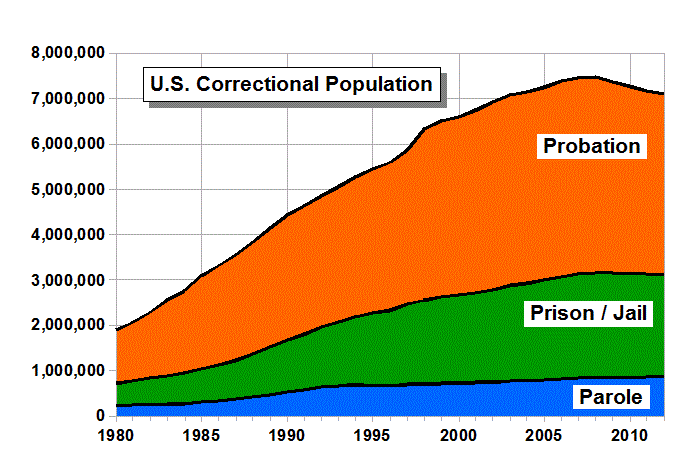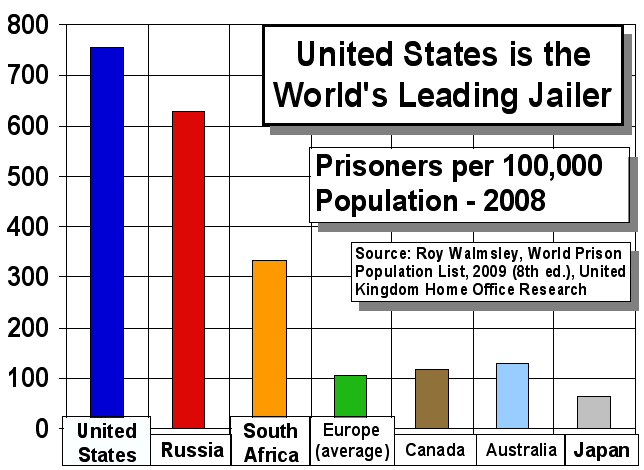As was foretold, we've added advertisements to the forums! If you have questions, or if you encounter any bugs, please visit this thread: https://forums.penny-arcade.com/discussion/240191/forum-advertisement-faq-and-reports-thread/
Options
America's Prison Industrial Complex: Man finally released after 43 years in solitary
joshofalltrades Class TraitorSmoke-filled roomRegistered User regular
Class TraitorSmoke-filled roomRegistered User regular
 Class TraitorSmoke-filled roomRegistered User regular
Class TraitorSmoke-filled roomRegistered User regular
I'm gonna rapid-fire some graphs at you.





Okay that's probably enough for now.
There's a lot of fodder for discussion here. Whether you feel that the problem is with the incarceration/recidivism rates themselves or feel that these are simply symptoms of a larger, systemic problem, the fact remains that we are doing something wrong in America. I'm by no means an expert and have no personal experience in prison, either as an employee or convict, but I nonetheless feel the issue is important.
One thing that absolutely has to change is the mixing of potentially violent offenders with no intention of becoming rehabilitated with people who, say, commit tax fraud. Technically we have different classes of prisons and different levels of security, and the really violent inmates are typically housed alone. However, with jail crowding at sort of insane levels, many times the books are fudged because there is simply no room to house inmates separately.
Surprising to nobody: throwing kids in jails ruins their lives and makes crime worse. When you send criminals who have fucked up to hang out with a bunch of other criminals all the time, some of which have been committing crimes their entire lives and may be more violent than the first-timers are, what do you imagine they will learn from the experience?
We can talk about the privatization of the prison system, too. Specifically, how the touted advantages (lower cost, higher quality) of doing so have completely fallen through.
Now I'm not trying to say that prisons are unnecessary. Clearly they are, for the people who have shown that they can not be productive and non-harmful members of society. But we are doing something wrong here. Americans lock up a higher percentage of their population than any other country on the planet, which I find deeply ironic coming from a country which constantly touts its freedoms. It's time to figure out what exactly we are doing wrong and how to fix it.





Okay that's probably enough for now.
There's a lot of fodder for discussion here. Whether you feel that the problem is with the incarceration/recidivism rates themselves or feel that these are simply symptoms of a larger, systemic problem, the fact remains that we are doing something wrong in America. I'm by no means an expert and have no personal experience in prison, either as an employee or convict, but I nonetheless feel the issue is important.
One thing that absolutely has to change is the mixing of potentially violent offenders with no intention of becoming rehabilitated with people who, say, commit tax fraud. Technically we have different classes of prisons and different levels of security, and the really violent inmates are typically housed alone. However, with jail crowding at sort of insane levels, many times the books are fudged because there is simply no room to house inmates separately.
Surprising to nobody: throwing kids in jails ruins their lives and makes crime worse. When you send criminals who have fucked up to hang out with a bunch of other criminals all the time, some of which have been committing crimes their entire lives and may be more violent than the first-timers are, what do you imagine they will learn from the experience?
We can talk about the privatization of the prison system, too. Specifically, how the touted advantages (lower cost, higher quality) of doing so have completely fallen through.
Now I'm not trying to say that prisons are unnecessary. Clearly they are, for the people who have shown that they can not be productive and non-harmful members of society. But we are doing something wrong here. Americans lock up a higher percentage of their population than any other country on the planet, which I find deeply ironic coming from a country which constantly touts its freedoms. It's time to figure out what exactly we are doing wrong and how to fix it.
joshofalltrades on
+15
Posts
this has been empirically confirmed again and again - hence hte increasing interest in intensive alternatives to custody
but as ever, the secret to reducing crime is not found in punishment policy...
the "no true scotch man" fallacy.
Yep, and our modern prison culture, like many other bits of toxic culture, has a "Made In Dixie" stamp on it.
Let's just say I am very surprised there is an organization like this based in Colville, WA. It is an area more known locally for right wing politics, and occasionally even some Christian Identity racist stuff.
-Indiana Solo, runner of blades
Because it only opens the door to incredible abuse and incentivizes larger prison populations because the same people that invest in these for profit prisons also are going to manipulate local and state level elections to get "tough on crime" people into positions to stuff even more people into their overcrowded prisons.
Basically the only type of job prisoners should be doing is the highway trash pickup, and it should be a reward for good behavior because it gets them out of the damn prison for the day. and they should get minimum wage for it, that they'll probably just use at the in prison store for snacks.
To fix prisons beyond that Americans are going to have to grow the fuck up and realize that its their alienation, demonization and denigration of prisoners is why so few people come out of prison truly rehabilitated.
But [and this is a big but (heh, I just said big butt)], it can't be a "10% of your income goes to pay the prison employees" or "you pay 50% of your wage in taxes" or some shit. Let them work for real, just under supervised conditions. The goal is to get people on the right track away from criminal behavior, which sitting in a cell or walking the yard with other criminals certainly doesn't do.
But I agree that if we can't do it right we shouldn't be doing it at all.
They can receive vocational training without incentivizing a modern slave labor force.
Prisoners of Profit
On a phone right now, but the case in PA was more than enough to convince me that for profit prisons need to die in a fire forever.
Why try to influence local elections to get "tough on crime" people in office, when you can just pay judges directly? Convince kids to plead out in the hopes of light (or no-time) sentences, judge hits them with the max instead, profit!
Can you explain how you came to the conclusion that a labor program will somehow rehabilitate someone?
I would argue that very, very rare is the person who is in jail because they literally do not know how to do basic labor.
I'm not saying that they are the end all be all rehabilitation method. I'm saying they are useful as a tool.
I can turn that around on you and ask you which you would prefer: having spent all your time in prison with no money to show for it when you get out, or having some money to live off of when you are released? Which of those situations do you think would encourage somebody to steal something for cash?
Obviously there is more that goes into it than simply allowing somebody to work. And I have already specified that if it can't be done in a way where there aren't people other than the workers standing to profit directly from it, then it shouldn't be done. I'm firmly against using prisoners for slave labor. However, if they want to work instead of sit in their cell, and they are a low risk, I don't see the harm.
Note also that I'm talking about non-violent drug offenders and the like, not letting Hannibal Lecter out to clean up the roads.
I don't think that's it.
I recommend watching that one too though, because it's pretty damning of the for-profit prison enterprise.
It's actually a pretty simple problem (even if the solutions aren't necessarily simple):
Poor performing prison systems are built with outside observers in mind; the prisoners are just a backboard to bounce public perception & carnal urges off of. We want to see bad things happen to bad people, so we have the government put them in orange jumpsuits and push them down a flight of stairs.
Since the objective of that effort plainly isn't to rehabilitate anyone, sure enough, hardly anyone becomes rehabilitated (and we reinforce an offender's perception that they now exist outside of society at large, so fuck it).
If the two options are, "Leave jail broke and without any hope of re-joining the economy," or "Leave jail with whatever pittance you were paid for punching-out license plates / sewing carriers for Interceptor armor," I'd say that the outcome from either choice is probably going to be a return to crime, so making that choice is pretty irrelevant.
I mean, you're saying that the prison labor should be given a fair wage, but the whole point of prison labor is that it's exploitable without consequence. You will never, ever realistically have an egalitarian work-from-prison system (why would Lockheed or Raytheon, to use your examples, ever use prison labor if it wasn't the cheapest thing available? The answer is that they wouldn't, of course, and neither would anyone else. Price point is the only selling feature here).
It's a system that can only exist in an abusive state.
Cite for work release programs only possibly existing in an abusive state ever please.
People are a lot like countries.
If they loudly proclaim and continue to reaffirm a fact, then its probably not a fact.
I.E. " I'm totally not a racist, but.. ", "America is the freedomyiest free freedom ever! "
The above was information known at least 4 years ago. I am really, really tired of hearing stories about coerced confessions in Texas.
I'm sorry, it still blows my mind that it took us 21 years to release a man and woman from prison after a trial with literally no physical evidence to support the prosecution's claims. Whatever happened to "innocent until proven guilty"?
I'm aware that miscarriages of justice happen, but it doesn't stop me from being outraged when people lose the third quarter of their life because of idiotic allegations which are totally unfounded and have no evidence to back them up. The entire case hinged upon the testimony of a little girl who was clearly making things up, and even recanted her confession on the stand in court.
tl;dr: A 16 year old was accused of robbery, with only one eyewitness to connect him to it. He couldn't make the $10,000 bail, so sat in Riker's Island for three years until the Bronx DA finally concluded they didn't have enough evidence to go to trial.
Is there such a thing as like an auto-Habeus Corpus statute, where if you don't take a case to trial by [date] the charges are automatically dismissed? I'd like that to be a thing.
I mean, this stuff is technically more about how awful the courts are, but it does tie in with the issue of prison overcrowding and such. At least part of the reason our prisons are so full is because we are so willing to send people there.
It happens because Jurors are people, and people are stupid.
They give disproportionate weight to the testimonies of "experts" and "eye witnesses". This fact is exacerbated by a power of 10 when it involves a child.
Its also why there should be federal oversight over all southern courtrooms, because every god damn time I hear about this type of shit it comes from a goddamn southern state.
IANAL but if I'm remembering right, there are actually circumstances where a judge can overrule a jury in cases where there the standard of evidence (reasonable doubt) is clearly not met.
I'd have to do some research on it but even though the trial itself was shameful, what really gets me is that it took 21 years for an appeal to finally get someone to take notice of the lack of evidence.
And on top of that, the weird "you have to show remorse" requirement for parole. What if the person maintains their innocence, like in this case? "You have to show us that you feel super bad about that stuff you did" is just the oddest check box to have to mark off. Like somebody couldn't just say they feel bad about it even if they didn't.
I'm not trying to make perfect the enemy of good, and I think there are a number of different avenues that absolutely should be pursued posthaste. The for-profit prison model needs to die in a fire, and non-violent (and first time) offenders shouldn't be housed with violent criminals who are facing long-term sentences or have spent their life in and out of prison. There should be reforms to the sentencing and plea bargain system. Prisoners shouldn't be used for slave labor - both because they are being exploited, and because it takes away jobs outside the prisons. Trying minors as adults should only be done in the most heinous and extreme of cases, if at all. Minors and adults should never be housed together under any circumstances.
Vocational training is great in theory, but if our society won't hire a former prisoner for anything but the most menial job (often with both corporate policy and legal / regulatory roadblocks for many job roles) it's ultimately a waste. If jobs and transition services aren't available, you're going to have people who turn back to crime because there aren't other options.
When it comes down to it, the magnitude of our problems come from one root issue - poverty. Yes, there will always be a need for prisons, and people from all classes and incomes commit serious crimes. But we should NEVER have people in prison who committed crimes truly out of necessity - and I consider most gang activity (drug dealing, violence, theft / burglary, etc) 'necessity' when you look at the reality of the people living in those mostly poor communities.
I SORT OF understand the 'have to show remorse' requirement for parole. You know the cliche that everyone in prison is innocent - just ask them?
For the system to work properly, especially with regard to parole, it has to act on the principle that every person convicted and sentenced was guilty of their crime. The parole board is not the place that innocence is determined or asserted - the place for that is in the courtroom during your trial and appeal.
If you are in front of the parole board, you are asking to have some of your sentence commuted and be allowed early release. You don't need to be granted parole, you can instead serve your complete sentence.
But in the eyes of the parole board, every person that appears before them must be guilty of their crimes, and if they don't show remorse for the crimes that they must have committed, it would be negligent to reintroduce them to society early. Everyone knows it's a big dog and pony show, just like how everyone 'finds Jesus' in prison. Even then, with the system we have right now, I understand why it's done that way and don't necessarily disagree with that particular component when taken as part of the whole.
Literally anybody, the worst murderer ever even, can say that they feel bad about doing what they did without having to mean it. Especially when they've been advised by their lawyers that it's a requirement for parole.
It's purely a formality which kept a likely completely innocent man and woman in jail for 21 years, because they fiercely maintained that there was nothing to be sorry for, and in all probability were being completely honest.
Prisons & military.
Its a formality that also double screws the innocent, because if they maintain their innocence they cant get out.
and if they lie and say they feel regret it'll be used as evidence against them if they try to appeal.
I do agree with you on pretty much everything. A huge issue is the increase in poverty and decrease in opportunities to escape it other than crime. Being tough on crime is roughly equivalent to being tough on poor people. There are white collar criminals who go to jail but they are an overwhelming minority for a reason.
This is why I'm so supportive of the social safety net. We need options for these people who feel they have nowhere else to turn.
QEDMF xbl: PantsB G+
I don't want to rain on the parade or anything, because it's good and signals movements in the right direction, but the drop is pretty small and a lot of it is a federal order to California to stop locking so many damn people up (half of the drop in the last year, according to the article).
So yes, this is cause for celebration, but it should be followed up on and we need to continue down this path.
Yes but on the otherhand it is a system that could only fuck over the innocent.
Like, if i was a rapist or a murderer I would give no shits about standing in front of the board and going "abloo abloo I'm so sorry". If I was an innocent person who has always maintained their innocence, I would.
It kind of relies on the idea that people who rape, murder and steal have a moral issue with lying.
Right. This is why we have therapists and psychiatrists who can evaluate people. It is much more difficult to appear normal over the course of several talk therapy sessions if you're truly a sociopath who intends to commit more crimes than it is to get in front of some people once and lie for an hour.
The more I hear about this requirement for parole the less I like it.
Now, I'm all for general structured sentences that do a gradual transition based on the sentence and time served, but any sort of parole system will have subjective judgement if it's providing early release.
If a person can get parole without asserting and demonstrating they are reformed - and again, the parole board must operate from a position that a guilty person is guilty, there is no reason for any prisoner to take a position that they don't need to reform because they never did anything wrong and are innocent.
Seems to be a general structural issue that manifests in a generally stupid policy in the edge case of an innocent person wrongly convicted seeking parole. Or I wish it was more of an edge case, that's for damn sure. How about less wrongful convictions being the target instead?-